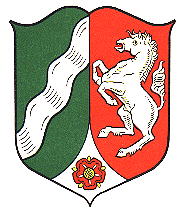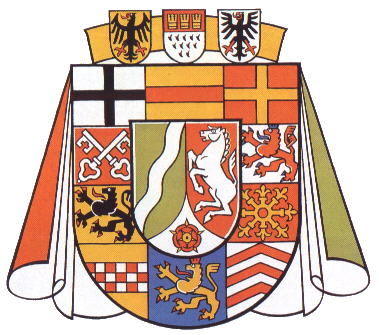Nordrhein-Westfalen: Difference between revisions
Knorrepoes (talk | contribs) No edit summary |
Knorrepoes (talk | contribs) m (Text replacement - "↵↵'''" to "'''") Tags: Mobile edit Mobile web edit |
||
| (19 intermediate revisions by the same user not shown) | |||
| Line 1: | Line 1: | ||
'''NORDRHEIN-WESTFALEN''' | '''NORDRHEIN-WESTFALEN''' | ||
[[File:nordrhei.jpg|center]]<br/> | [[File:nordrhei.jpg|center|Wappen von {{PAGENAME}}/Coat of arms (crest) of {{PAGENAME}}]]<br/> | ||
===Origin/meaning=== | |||
The arms were granted on March 10, 1953. | The arms were granted on March 10, 1953. | ||
| Line 16: | Line 10: | ||
The rose of Lippe is taken as a large part of the state was part of the [[Principality of Lippe]], which became a province of Prussia in 1921. The rose as arms for the counts of Lippe is known since Bernard II zur Lippe (1167-1200). | The rose of Lippe is taken as a large part of the state was part of the [[Principality of Lippe]], which became a province of Prussia in 1921. The rose as arms for the counts of Lippe is known since Bernard II zur Lippe (1167-1200). | ||
Westfalen was first a duchy. later a grand-duchy under the arch-bishops of | Westfalen was first a duchy. later a grand-duchy under the arch-bishops of Köln (Cologne). Ever since arms of Westfalen are known, the stallion was part of the arms. The stallion itself is derived from the arms of the Nieder Sachsen (lower Saxony area, not the present State). It was also one of the major symbols in the arms of the (short-lived) [[Kingdom of Westfalen]] in the 19<sup>th</sup> century and the Prussian [[Province of Westfalen]]. | ||
The white bend symbolises the river Rhein (Rhine) flowing through fertile land. It was devised in 1817 for the Prussian [[Rheinprovince]] and grand-duchy Niederrhein. | The white bend symbolises the river Rhein (Rhine) flowing through fertile land. It was devised in 1817 for the Prussian [[Rheinprovince]] and grand-duchy Niederrhein. | ||
| Line 27: | Line 21: | ||
{|align="center" | {|align="center" | ||
|align="center"|[[File:nrw2.jpg|center]] <br/>The design of 1958 | |align="center"|[[File:nrw2.jpg|center|Wappen von {{PAGENAME}}/Coat of arms (crest) of {{PAGENAME}}]] <br/>The design of 1958 | ||
|} | |} | ||
[[Literature]] : Stadler | [[Civic Heraldry Literature - Germany|'''Literature''']]: Stadler, 1964-1971, 8 volumes. | ||
{{de}} | |||
{{media}} | |||
[[Category:German States]] | [[Category:German States]] | ||
[[Category:Nordrhein-Westfalen]] | [[Category:Nordrhein-Westfalen]] | ||
[[Category:Granted 1953]] | [[Category:Granted 1953]] | ||
Latest revision as of 14:44, 7 January 2024
NORDRHEIN-WESTFALEN
Origin/meaning
The arms were granted on March 10, 1953.
The arms are a combination of the rose of Lippe, the stallion of Westfalen and the arms of the Grand-Duchy Niederrhein.
The rose of Lippe is taken as a large part of the state was part of the Principality of Lippe, which became a province of Prussia in 1921. The rose as arms for the counts of Lippe is known since Bernard II zur Lippe (1167-1200).
Westfalen was first a duchy. later a grand-duchy under the arch-bishops of Köln (Cologne). Ever since arms of Westfalen are known, the stallion was part of the arms. The stallion itself is derived from the arms of the Nieder Sachsen (lower Saxony area, not the present State). It was also one of the major symbols in the arms of the (short-lived) Kingdom of Westfalen in the 19th century and the Prussian Province of Westfalen.
The white bend symbolises the river Rhein (Rhine) flowing through fertile land. It was devised in 1817 for the Prussian Rheinprovince and grand-duchy Niederrhein.
In 1958/59 there was some interest in devising Great-arms of Nordrhein-Westfalen, which were supposed to be made up of the arms of the ten most important historical parts of the state, and the present arms were to be added as an escutcheon.
The historical areas were : State of Köln (cross), Paderborn, Münster, Minden, Berg (a red lion, with blue tongue, crown and nails) Jülich, Kleve, Mark (see the arms of Hamm), Ravensberg and Geldern. Above the shield the arms of the cities of Aachen, Köln and Duisburg.
As these arms would be rather complicated the plan was dropped.
| The design of 1958 |
Literature: Stadler, 1964-1971, 8 volumes.
This page is part of the German heraldry portal |
Heraldry of the World |
|
German heraldry:
|
Selected collector's items from Germany:
|
Contact and Support
Partners:
Your logo here ?
Contact us
© since 1995, Heraldry of the World, Ralf Hartemink 
Index of the site













